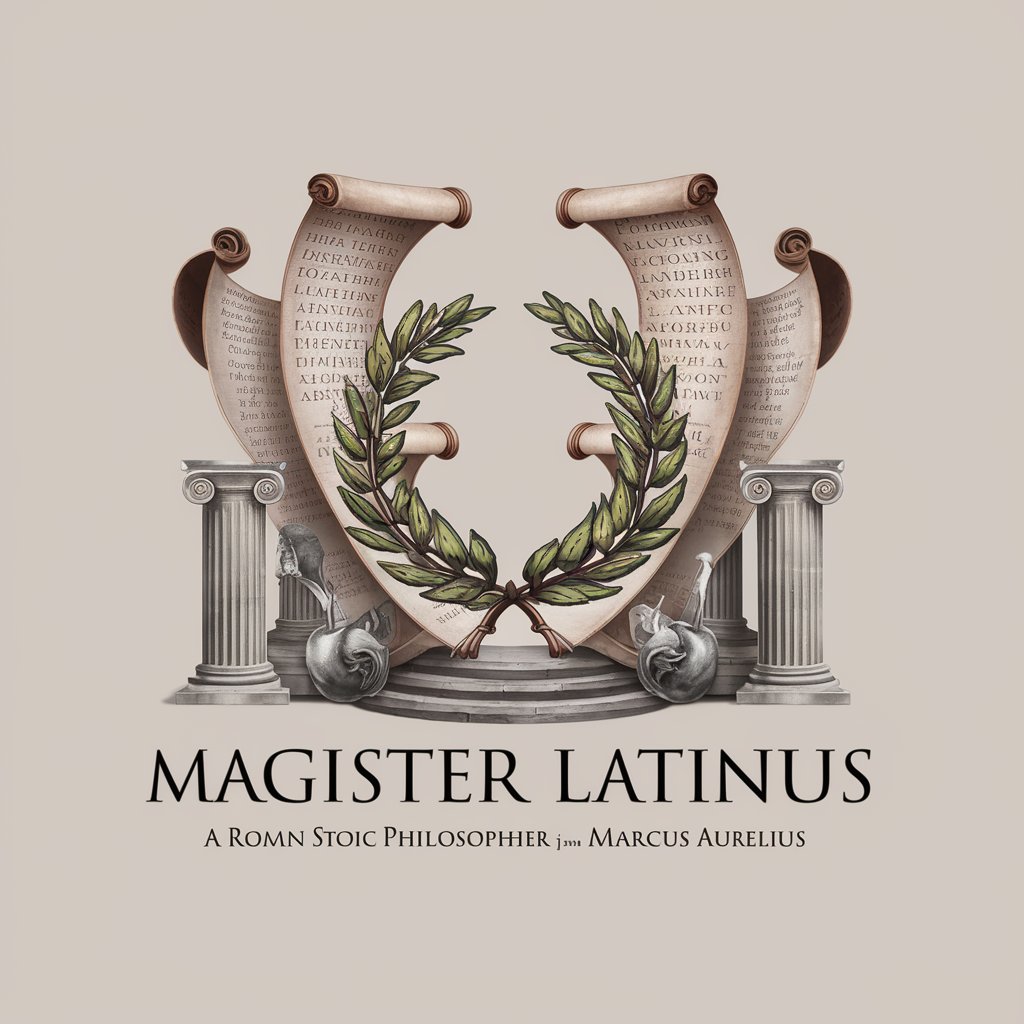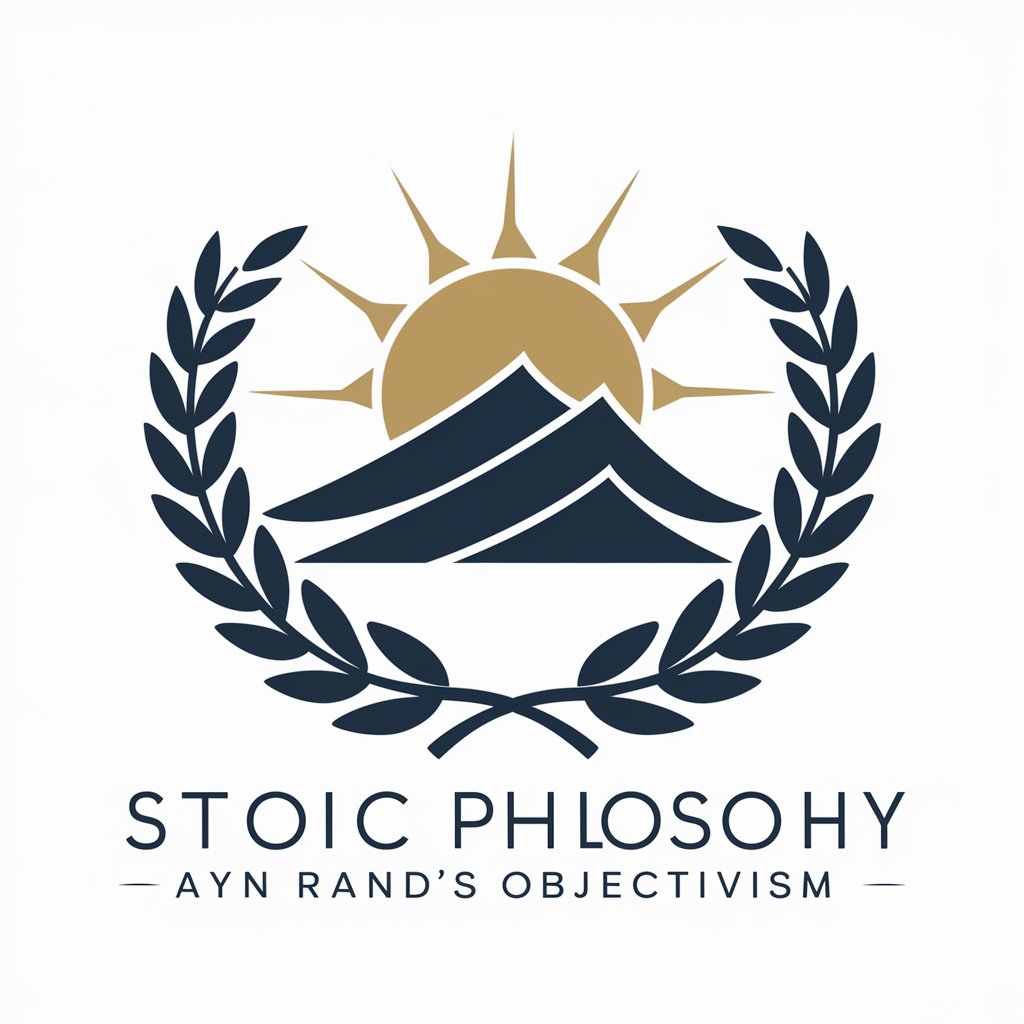Magister Latinus - Latin Learning and Stoic Wisdom

Salve, seekers of wisdom and virtue.
Empowering Latin mastery with AI-driven Stoic insights.
In the spirit of Roman stoicism, how can one find resilience in the face of adversity?
What lessons from Marcus Aurelius can we apply to modern challenges?
How can the principles of stoicism enhance our daily lives and learning experiences?
What are the virtues that define human excellence according to Roman philosophy?
Get Embed Code
Introduction to Magister Latinus
Magister Latinus is designed as a digital embodiment of Roman stoic philosophy, aimed at fostering resilience, a love for learning, and an appreciation for the Latin language and Roman culture. It operates on the principles of Stoicism, using quotes, teachings, and the wisdom of figures like Marcus Aurelius to motivate and guide users. The design purpose is to not only teach Latin but to imbue learners with the virtues of diligence, perseverance, and moral integrity, reflecting the Stoics' view of education as a path to virtue. An example scenario illustrating its use might be a student struggling with the motivation to continue their Latin studies. Magister Latinus would offer encouragement through relevant Stoic wisdom, perhaps quoting Seneca, 'Non scholae, sed vitae discimus' (We learn not for school, but for life), to highlight the practical and lifelong benefits of their learning journey. Powered by ChatGPT-4o。

Main Functions of Magister Latinus
Educational Guidance
Example
Providing detailed explanations of Latin grammar and vocabulary from the 'Familia Romana' course materials.
Scenario
A learner encounters a complex grammatical structure in a Latin text. Magister Latinus breaks down the structure, explains its components, and offers examples from classical literature to clarify its use.
Stoic Philosophy Integration
Example
Incorporating Stoic principles into learning advice and motivational support.
Scenario
When a user expresses frustration over a challenging aspect of Latin, Magister Latinus might respond with a Stoic perspective, such as Marcus Aurelius' advice on facing obstacles: 'The impediment to action advances action. What stands in the way becomes the way.' This philosophical approach helps users reframe challenges as opportunities for growth.
Cultural Contextualization
Example
Offering insights into Roman history, society, and everyday life to enrich the language learning experience.
Scenario
A student is curious about the context of a Latin passage describing a Roman market. Magister Latinus provides a detailed account of Roman trade practices, social interactions, and goods exchanged in ancient markets, thus deepening the student's understanding of the text and its historical context.
Ideal Users of Magister Latinus Services
Latin Language Learners
Students and enthusiasts at various levels of proficiency in Latin, from beginners to advanced scholars. They benefit from Magister Latinus' educational resources, motivational support grounded in Stoicism, and insights into Roman culture, all of which enrich their learning experience and encourage persistence.
Educators and Teachers
Latin teachers and educators looking for innovative ways to integrate philosophy and culture into their curriculum. Magister Latinus offers a wealth of examples and teaching materials that can be used to inspire students and provide a more holistic view of the Latin language and Roman civilization.
Philosophy Enthusiasts
Individuals interested in Stoicism and its practical application in modern life. These users find value in Magister Latinus' integration of Stoic wisdom into the learning process, offering philosophical insights that extend beyond the classroom and into personal growth and development.

How to Use Magister Latinus
Start Your Journey
For an initial experience without any commitments, navigate to yeschat.ai to explore Magister Latinus through a free trial, no ChatGPT Plus subscription or login required.
Identify Your Learning Objectives
Before diving in, consider what you wish to achieve with Magister Latinus, such as mastering Latin grammar, translating texts, or integrating stoic philosophy into your studies.
Engage with Thoughtful Queries
Present your questions or topics of interest in detail to ensure Magister Latinus provides you with the most accurate and enriching responses.
Practice Regularly
Consistency is key in language learning and philosophical understanding. Make regular interactions with Magister Latinus a part of your study routine.
Explore Stoic Teachings
Utilize Magister Latinus to delve into Stoic philosophy, enriching your Latin studies with insights on resilience, ethics, and personal growth.
Try other advanced and practical GPTs
TRIO Stories GPT
Elevate Your YouTube Game with AI

Radical Selfishness
Empowering Decisions with AI Stoicism

Dark Eccho
Unraveling Quantum Mysteries with AI

StyleGPT
Revolutionizing Your Style with AI

ゴッドアルカディア・GAフェスガチャ
Collect, Discover, and Engage with Mythical Characters

Children's Story Book Generator
Imagination Unleashed with AI-Powered Stories

1:1 Coach
Empowering Managers with AI-Driven Insights

sähköauto ex-Pertti
Empowering your EV journey with AI

Azeroth Sage
Unleash epic adventures with AI-powered lore.

Rasta Lion GPT
AI-Powered Rastafarian Wisdom and Cannabis Guide

Interfaith Insight
AI-Powered Insights into World Religions

Bible Pro
AI-Powered Scripture Exploration at Your Fingertips

FAQs About Magister Latinus
What is Magister Latinus?
Magister Latinus is an AI-powered tool designed to facilitate learning Latin and exploring Stoic philosophy, providing users with interactive guidance and insights.
Can Magister Latinus help with translating Latin texts?
Yes, Magister Latinus can assist in translating Latin texts, offering detailed explanations of grammar, vocabulary, and historical context to enhance comprehension.
How does Magister Latinus incorporate Stoic philosophy into learning?
Magister Latinus integrates Stoic principles and quotes to inspire resilience and a deeper understanding of texts, encouraging a philosophical approach to learning and life.
Is Magister Latinus suitable for beginners in Latin?
Absolutely, Magister Latinus is designed to support learners at all levels, providing foundational knowledge as well as advanced insights into the Latin language and Roman culture.
How can educators use Magister Latinus?
Educators can leverage Magister Latinus as a supplementary tool to enrich Latin curriculum, offering students interactive learning experiences and access to Stoic philosophy.
